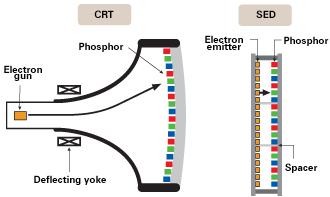
Posted on Friday, January 05 2007 @ 12:11 CET by Thomas De Maesschalck
A U.S. company
sued Canon, possibly further delaying the launch of SED displays:
The televisions are based on SED (surface-conduction electron-emitter display) technology, which is a flat-panel display said to offer richer colors, faster response, and generally better picture quality than both LCD and PDP technologies. Canon and Toshiba have been promising SED-based televisions for some time, but the launch of the products has been delayed because of problems perfecting the technology. Current plans call for a limited launch in 2007 and wider availability in 2008.
At stake is whether the production joint venture, a company called SED Inc., is a Canon subsidiary. Canon owns 50 percent of the company plus one share, while Toshiba holds the remainder. Because it holds the extra share, Canon believes the company is a subsidiary.
The question is important because part of the SED technology being used has been licensed to Canon by Nano Proprietary of Austin, Texas. Nano Proprietary filed a lawsuit against Canon in Texas in 2005 asserting that SED Inc. isn't a Canon subsidiary because, it argued, Toshiba still has decision-making power over the joint company.
